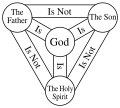The Reformed Christianity Portal
Reformed Christianity, also called Calvinism, is a major branch of Protestantism that began during the sixteenth-century Protestant Reformation, a schism in the Western Church. In the modern day, it is largely represented by the Continental Reformed, Presbyterian, and Congregational traditions, as well as parts of the Anglican (known as "Episcopal" in some regions) and Baptist traditions.
Reformed theology emphasizes the authority of the Bible and the sovereignty of God, as well as covenant theology, a framework for understanding the Bible based on God's covenants with people. Reformed churches have emphasized simplicity in worship. Several forms of ecclesiastical polity are exercised by Reformed churches, including presbyterian, congregational, and some episcopal. Articulated by John Calvin, the Reformed faith holds to a spiritual (pneumatic) presence of Christ in the Lord's Supper.
Emerging in the 16th century, the Reformed tradition developed over several generations, especially in Switzerland, Scotland and the Netherlands. In the seventeenth century, Jacobus Arminius and the Remonstrants were expelled from the Dutch Reformed Church over disputes regarding predestination and salvation, and from that time Arminians are usually considered to be a distinct tradition from the Reformed. This dispute produced the Canons of Dort, the basis for the "doctrines of grace" also known as the "five points" of Calvinism. (Full article...)
Selected article
When Mary Tudor ascended the throne and reestablished Roman Catholicism, Knox was forced to resign his position and leave the country. Knox first moved to Geneva and then to Frankfurt. On his return to Scotland, he led the Protestant Reformation in Scotland, in partnership with the Scottish Protestant nobility. Knox helped write the new confession of faith and the ecclesiastical order for the newly created reformed church, the Kirk. He continued to serve as the religious leader of the Protestants throughout Mary's reign. In several interviews with the queen, Knox admonished her for supporting Roman practices. Eventually, when she was imprisoned and James VI enthroned in her stead, he openly attacked her in sermons. He continued to preach until his final days.
Selected images
Did you know...
- ...that Peter Martyr Vermigli was allegedly challenged to a duel with a double-edged axe by Theodore Bibliander over the doctrine of double predestination?
- ...that in Reformed theology, the sacrament of the Lord's Supper is believed to strengthen Christians' union with Christ by the spiritual eating of his true body and blood?
- ... that the Presbyterian Church of Victoria was formed in 1859 as a union of Church of Scotland, Free Presbyterian and United Presbyterian congregations?
Subcategories
Topics
Background: Christianity • St. Augustine • The Reformation • John Calvin • Five Solas • Synod of Dort
Theology: Five Points (TULIP) • Covenant Theology • Regulative principle
Documents: Calvin's Institutes • Confessions of faith • Geneva Bible
Influences: Theodore Beza • John Knox • Jonathan Edwards • Princeton theologians • Henry Cooke
Churches: Reformed • Presbyterian • Congregationalist • Reformed Baptist
Peoples: Afrikaner Calvinists • Huguenots • Pilgrims • Puritans • Scots • Ulster Protestants
WikiProjects
Things to do
 |
Here are some tasks awaiting attention:
|
If those don't satisfy, try wandering through Category:Reformed Christianity articles by quality looking for things to do.
Related portals
Associated Wikimedia
The following Wikimedia Foundation sister projects provide more on this subject:
-
Commons
Free media repository -
Wikibooks
Free textbooks and manuals -
Wikidata
Free knowledge base -
Wikinews
Free-content news -
Wikiquote
Collection of quotations -
Wikisource
Free-content library -
Wikiversity
Free learning tools -
Wiktionary
Dictionary and thesaurus

























